- Home
- Jack London
The Turtles of Tasman Page 2
The Turtles of Tasman Read online
Page 2
And there were more young men at the house than formerly, and they helped in disposing of the cocktails. Frederick would have liked to account in that manner for their presence, but he knew better. His brother and his brother's daughter did what he and Mary had failed to do. They were the magnets. Youth and joy and laughter drew to them. The house was lively with young life. Ever, day and night, the motor cars honked up and down the gravelled drives. There were picnics and expeditions in the summer weather, moonlight sails on the bay, starts before dawn or home-comings at midnight, and often, of nights, the many bedrooms were filled as they had never been before. Tom must cover all his boyhood ramblings, catch trout again on Bull Creek, shoot quail over Walcott's Prairie, get a deer on Round Mountain. That deer was a cause of pain and shame to Frederick. What if it was closed season? Tom had triumphantly brought home the buck and gleefully called it sidehill-salmon when it was served and eaten at Frederick 's own table.
They had clambakes at the head of the bay and musselbakes down by the roaring surf; and Tom told shamelessly of the Halcyon, and of the run of contraband, and asked Frederick before them all how he had managed to smuggle the horse back to the fishermen without discovery. All the young men were in the conspiracy with Polly to pamper Tom to his heart's desire. And Frederick heard the true inwardness of the killing of the deer; of its purchase from the overstocked Golden Gate Park; of its crated carriage by train, horse-team and mule-back to the fastnesses of Round Mountain; of Tom falling asleep beside the deer-run the first time it was driven by; of the pursuit by the young men, the jaded saddle horses, the scrambles and the falls, and the roping of it at Burnt Ranch Clearing; and, finally, of the triumphant culmination, when it was driven past a second time and Tom had dropped it at fifty yards. To Frederick there was a vague hurt in it all. When had such consideration been shown him?
There were days when Tom could not go out, postponements of outdoor frolics, when, still the centre, he sat and drowsed in the big chair, waking, at times, in that unexpected queer, bright way of his, to roll a cigarette and call for his ukulele-a sort of miniature guitar of Portuguese invention. Then, with strumming and tumtuming, the live cigarette laid aside to the imminent peril of polished wood, his full baritone would roll out in South Sea hulas and sprightly French and Spanish songs.
One, in particular, had pleased Frederick at first. The favourite song of a Tahitian king, Tom explained-the last of the Pomares, who had himself composed it and was wont to lie on his mats by the hour singing it. It consisted of the repetition of a few syllables. "E meu ru ru a vau," it ran, and that was all of it, sung in a stately, endless, ever-varying chant, accompanied by solemn chords from the ukelele. Polly took great joy in teaching it to her uncle, but when, himself questing for some of this genial flood of life that bathed about his brother, Frederick essayed the song, he noted suppressed glee on the part of his listeners, which increased, through giggles and snickers, to a great outburst of laughter. To his disgust and dismay, he learned that the simple phrase he had repeated and repeated was nothing else than "I am so drunk." He had been made a fool of. Over and over, solemnly and gloriously, he, Frederick Travers, had announced how drunk he was. After that, he slipped quietly out of the room whenever it was sung. Nor could Polly's later explanation that the last word was "happy," and not "drunk," reconcile him; for she had been compelled to admit that the old king was a toper, and that he was always in his cups when he struck up the chant.
Frederick was constantly oppressed by the feeling of being out of it all. He was a social being, and he liked fun, even if it were of a more wholesome and dignified brand than that to which his brother was addicted. He could not understand why in the past the young people had voted his house a bore and come no more, save on state and formal occasions, until now, when they flocked to it and to his brother, but not to him. Nor could he like the way the young women petted his brother, and called him Tom, while it was intolerable to see them twist and pull his buccaneer moustache in mock punishment when his sometimes too-jolly banter sank home to them.
Such conduct was a profanation to the memory of Isaac and Eliza Travers. There was too much an air of revelry in the house. The long table was never shortened, while there was extra help in the kitchen. Breakfast extended from four until eleven, and the midnight suppers, entailing raids on the pantry and complaints from the servants, were a vexation to Frederick. The house had become a restaurant, a hotel, he sneered bitterly to himself; and there were times when he was sorely tempted to put his foot down and reassert the old ways. But somehow the ancient sorcery of his masterful brother was too strong upon him; and at times he gazed upon him with a sense almost of awe, groping to fathom the alchemy of charm, baffled by the strange lights and fires in his brother's eyes, and by the wisdom of far places and of wild nights and days written in his face. What was it? What lordly vision had the other glimpsed?-he, the irresponsible and careless one? Frederick remembered a line of an old song-"Along the shining ways he came." Why did his brother remind him of that line? Had he, who in boyhood had known no law, who in manhood had exalted himself above law, in truth found the shining ways?
There was an unfairness about it that perplexed Frederick, until he found solace in dwelling upon the failure Tom had made of life. Then it was, in quiet intervals, that he got some comfort and stiffened his own pride by showing Tom over the estate.
"You have done well, Fred," Tom would say. "You have done very well."
He said it often, and often he drowsed in the big smooth-running machine.
"Everything orderly and sanitary and spick and span-not a blade of grass out of place," was Polly's comment. "How do you ever manage it? I should not like to be a blade of grass on your land," she concluded, with a little shivery shudder.
"You have worked hard," Tom said.
"Yes, I have worked hard," Frederick affirmed. "It was worth it."
He was going to say more, but the strange flash in the girl's eyes brought him to an uncomfortable pause. He felt that she measured him, challenged him. For the first time his honourable career of building a county commonwealth had been questioned-and by a chit of a girl, the daughter of a wastrel, herself but a flighty, fly-away, foreign creature.
Conflict between them was inevitable. He had disliked her from the first moment of meeting. She did not have to speak. Her mere presence made him uncomfortable. He felt her unspoken disapproval, though there were times when she did not stop at that. Nor did she mince language. She spoke forthright, like a man, and as no man had ever dared to speak to him.
"I wonder if you ever miss what you've missed," she told him. "Did you ever, once in your life, turn yourself loose and rip things up by the roots? Did you ever once get drunk? Or smoke yourself black in the face? Or dance a hoe-down on the ten commandments? Or stand up on your hind legs and wink like a good fellow at God?"
"Isn't she a rare one!" Tom gurgled. "Her mother over again."
Outwardly smiling and calm, there was a chill of horror at Frederick 's heart. It was incredible.
"I think it is the English," she continued, "who have a saying that a man has not lived until he has kissed his woman and struck his man. I wonder-confess up, now-if you ever struck a man."
"Have you?" he countered.
She nodded, an angry reminiscent flash in her eyes, and waited.
"No, I have never had that pleasure," he answered slowly. "I early learned control."
Later, irritated by his self-satisfied complacence and after listening to a recital of how he had cornered the Klamath salmon-packing, planted the first oysters on the bay and established that lucrative monopoly, and of how, after exhausting litigation and a campaign of years he had captured the water front of Williamsport and thereby won to control of the Lumber Combine, she returned to the charge.
"You seem to value life in terms of profit and loss," she said. "I wonder if you have ever known love."
The shaft went home. He had not kissed his woman. His marriage had been one of
policy. It had saved the estate in the days when he had been almost beaten in the struggle to disencumber the vast holdings Isaac Travers' wide hands had grasped. The girl was a witch. She had probed an old wound and made it hurt again. He had never had time to love. He had worked hard. He had been president of the chamber of commerce, mayor of the city, state senator, but he had missed love. At chance moments he had come upon Polly, openly and shamelessly in her father's arms, and he had noted the warmth and tenderness in their eyes. Again he knew that he had missed love. Wanton as was the display, not even in private did he and Mary so behave. Normal, formal, and colourless, she was what was to be expected of a loveless marriage. He even puzzled to decide whether the feeling he felt for her was love. Was he himself loveless as well?
In the moment following Polly's remark, he was aware of a great emptiness. It seemed that his hands had grasped ashes, until, glancing into the other room, he saw Tom asleep in the big chair, very grey and aged and tired. He remembered all that he had done, all that he possessed. Well, what did Tom possess? What had Tom done?-save play ducks and drakes with life and wear it out until all that remained was that dimly flickering spark in a dying body.
What bothered Frederick in Polly was that she attracted him as well as repelled him. His own daughter had never interested him in that way. Mary moved along frictionless grooves, and to forecast her actions was so effortless that it was automatic. But Polly! many-hued, protean-natured, he never knew what she was going to do next.
"Keeps you guessing, eh?" Tom chuckled.
She was irresistible. She had her way with Frederick in ways that in Mary would have been impossible. She took liberties with him, cosened him or hurt him, and compelled always in him a sharp awareness of her existence.
Once, after one of their clashes, she devilled him at the piano, playing a mad damned thing that stirred and irritated him and set his pulse pounding wild and undisciplined fancies in the ordered chamber of his brain. The worst of it was she saw and knew just what she was doing. She was aware before he was, and she made him aware, her face turned to look at him, on her lips a mocking, contemplative smile that was almost a superior sneer. It was this that shocked him into consciousness of the orgy his imagination had been playing him. From the wall above her, the stiff portraits of Isaac and Eliza Travers looked down like reproachful spectres. Infuriated, he left the room. He had never dreamed such potencies resided in music. And then, and he remembered it with shame, he had stolen back outside to listen, and she had known, and once more she had devilled him.
When Mary asked him what he thought of Polly's playing, an unbidden contrast leaped to his mind. Mary's music reminded him of church. It was cold and bare as a Methodist meeting house. But Polly's was like the mad and lawless ceremonial of some heathen temple where incense arose and nautch girls writhed.
"She plays like a foreigner," he answered, pleased with the success and oppositeness of his evasion.
"She is an artist," Mary affirmed solemnly. "She is a genius. When does she ever practise? When did she ever practise? You know how I have. My best is like a five-finger exercise compared with the foolishest thing she ripples off. Her music tells me things-oh, things wonderful and unutterable. Mine tells me, 'one-two-three, one-two-three.' Oh, it is maddening! I work and work and get nowhere. It is unfair. Why should she be born that way, and not I?"
"Love," was Frederick 's immediate and secret thought; but before he could dwell upon the conclusion, the unprecedented had happened and Mary was sobbing in a break-down of tears. He would have liked to take her in his arms, after Tom's fashion, but he did not know how. He tried, and found Mary as unschooled as himself. It resulted only in an embarrassed awkwardness for both of them.
The contrasting of the two girls was inevitable. Like father like daughter. Mary was no more than a pale camp-follower of a gorgeous, conquering general. Frederick 's thrift had been sorely educated in the matter of clothes. He knew just how expensive Mary's clothes were, yet he could not blind himself to the fact that Polly's vagabond makeshifts, cheap and apparently haphazard, were always all right and far more successful. Her taste was unerring. Her ways with a shawl were inimitable. With a scarf she performed miracles.
"She just throws things together," Mary complained. "She doesn't even try. She can dress in fifteen minutes, and when she goes swimming she beats the boys out of the dressing rooms." Mary was honest and incredulous in her admiration. "I can't see how she does it. No one could dare those colours, but they look just right on her."
"She's always threatened that when I became finally flat broke she'd set up dressmaking and take care of both of us," Tom contributed.
Frederick, looking over the top of a newspaper, was witness to an illuminating scene; Mary, to his certain knowledge, had been primping for an hour ere she appeared.
"Oh! How lovely!" was Polly's ready appreciation. Her eyes and face glowed with honest pleasure, and her hands wove their delight in the air. "But why not wear that bow so and thus?"
Her hands flashed to the task, and in a moment the miracle of taste and difference achieved by her touch was apparent even to Frederick.
Polly was like her father, generous to the point of absurdity with her meagre possessions. Mary admired a Spanish fan-a Mexican treasure that had come down from one of the grand ladies of the Court of the Emperor Maximilian. Polly's delight flamed like wild-fire. Mary found herself the immediate owner of the fan, almost labouring under the fictitious impression that she had conferred an obligation by accepting it. Only a foreign woman could do such things, and Polly was guilty of similar gifts to all the young women. It was her way. It might be a lace handkerchief, a pink Paumotan pearl, or a comb of hawksbill turtle. It was all the same. Whatever their eyes rested on in joy was theirs. To women, as to men, she was irresistible.
"I don't dare admire anything any more," was Mary's plaint. "If I do she always gives it to me."
Frederick had never dreamed such a creature could exist. The women of his own race and place had never adumbrated such a possibility. He knew that whatever she did-her quick generosities, her hot enthusiasms or angers, her birdlike caressing ways-was unbelievably sincere. Her extravagant moods at the same time shocked and fascinated him. Her voice was as mercurial as her feelings. There were no even tones, and she talked with her hands. Yet, in her mouth, English was a new and beautiful language, softly limpid, with an audacity of phrase and tellingness of expression that conveyed subtleties and nuances as unambiguous and direct as they were unexpected from one of such childlikeness and simplicity. He woke up of nights and on his darkened eyelids saw bright memory-pictures of the backward turn of her vivid, laughing face.
IV
Like daughter like father. Tom, too, had been irresistible. All the world still called to him, and strange men came from time to time with its messages. Never had there been such visitors to the Travers home. Some came with the reminiscent roll of the sea in their gait. Others were black-browed ruffians; still others were fever-burnt and sallow; and about all of them was something bizarre and outlandish. Their talk was likewise bizarre and outlandish, of things to Frederick unguessed and undreamed, though he recognised the men for what they were-soldiers of fortune, adventurers, free lances of the world. But the big patent thing was the love and loyalty they bore their leader. They named him variously?-Black Tom, Blondine, Husky Travers, Malemute Tom, Swiftwater Tom-but most of all he was Captain Tom. Their projects and propositions were equally various, from the South Sea trader with the discovery of a new guano island and the Latin-American with a nascent revolution on his hands, on through Siberian gold chases and the prospecting of the placer benches of the upper Kuskokeem, to darker things that were mentioned only in whispers. And Captain Tom regretted the temporary indisposition that prevented immediate departure with them, and continued to sit and drowse more and more in the big chair. It was Polly, with a camaraderie distasteful to her uncle, who got these men aside and broke the news that Captain Tom would never go out o
n the shining ways again. But not all of them came with projects. Many made love-calls on their leader of old and unforgetable days, and Frederick sometimes was a witness to their meeting, and he marvelled anew at the mysterious charm in his brother that drew all men to him.
"By the turtles of Tasman!" cried one, "when I heard you was in California, Captain Tom, I just had to come and shake hands. I reckon you ain't forgot Tasman, eh?-nor the scrap at Thursday Island. Say-old Tasman was killed by his niggers only last year up German New Guinea way. Remember his cook-boy?-Ngani-Ngani? He was the ringleader. Tasman swore by him, but Ngani-Ngani hatcheted him just the same."
"Shake hands with Captain Carlsen, Fred," was Tom's introduction of his brother to another visitor. "He pulled me out of a tight place on the West Coast once. I'd have cashed in, Carlsen, if you hadn't happened along."
Captain Carlsen was a giant hulk of a man, with gimlet eyes of palest blue, a slash-scarred mouth that a blazing red beard could not quite hide, and a grip in his hand that made Frederick squirm.

 The Son of the Wolf
The Son of the Wolf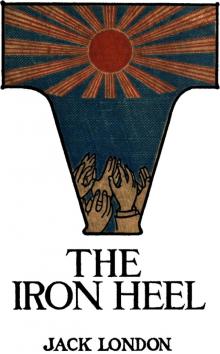 The Iron Heel
The Iron Heel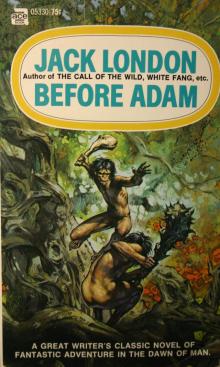 Before Adam
Before Adam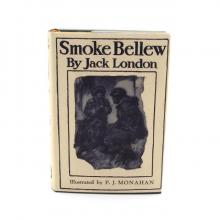 Smoke Bellew
Smoke Bellew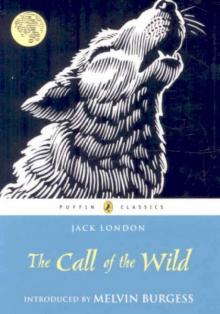 The Call of the Wild
The Call of the Wild The Valley of the Moon Jack London
The Valley of the Moon Jack London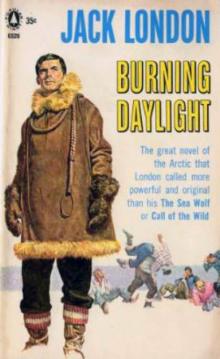 Burning Daylight
Burning Daylight The Sea Wolf
The Sea Wolf White Fang
White Fang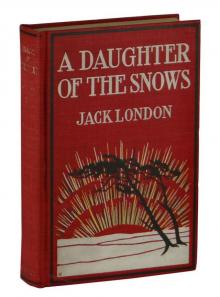 A Daughter of the Snows
A Daughter of the Snows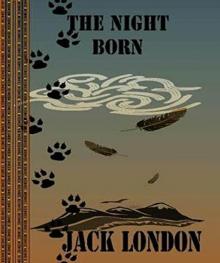 The Night-Born
The Night-Born A Son Of The Sun
A Son Of The Sun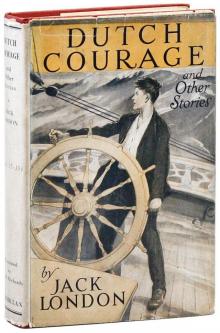 Dutch Courage and Other Stories
Dutch Courage and Other Stories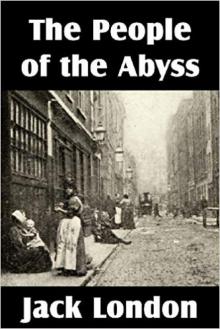 The People of the Abyss
The People of the Abyss Michael, Brother of Jerry
Michael, Brother of Jerry Love of Life, and Other Stories
Love of Life, and Other Stories Lost Face
Lost Face The Road
The Road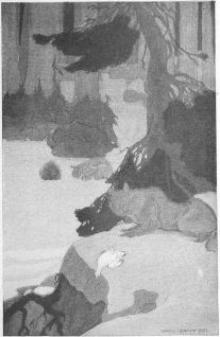 Love of Life
Love of Life The Turtles of Tasman
The Turtles of Tasman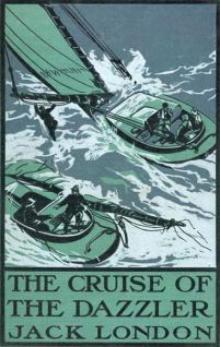 The Cruise of The Dazzler
The Cruise of The Dazzler The Heathen
The Heathen The Scab
The Scab The Faith of Men
The Faith of Men Adventure
Adventure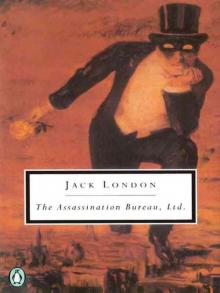 The Assassination Bureau, Ltd.
The Assassination Bureau, Ltd.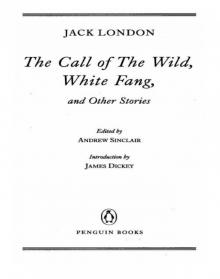 The Call of the Wild, White Fang, and Other Stories
The Call of the Wild, White Fang, and Other Stories The Call of the Wild and Selected Stories
The Call of the Wild and Selected Stories Jerry of the Islands
Jerry of the Islands Hearts of Three
Hearts of Three The House of Pride
The House of Pride Moon-Face and Other Stories
Moon-Face and Other Stories Children of the Frost
Children of the Frost South Sea Tales
South Sea Tales The Strength of the Strong
The Strength of the Strong The Jacket (The Star-Rover)
The Jacket (The Star-Rover) The Little Lady of the Big House
The Little Lady of the Big House John Barleycorn
John Barleycorn ADaugter of Snows
ADaugter of Snows The Mutiny of the Elsinore
The Mutiny of the Elsinore Northland Stories
Northland Stories Tales of the Fish Patrol
Tales of the Fish Patrol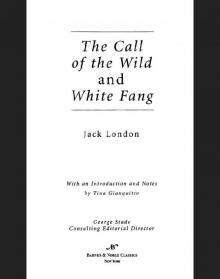 Call of the Wild and White Fang (Barnes & Noble Classics Series)
Call of the Wild and White Fang (Barnes & Noble Classics Series) The Valley of the Moon
The Valley of the Moon The Cruise of the Snark
The Cruise of the Snark The Game
The Game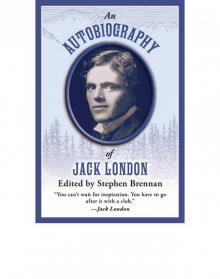 An Autobiography of Jack London
An Autobiography of Jack London